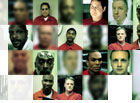Elimination of political opponents
The authorities executed three people and sentenced six others to long prison terms allegedly for attacking and killing members of the ruling Baath party. They and many others were arrested following an attack on a branch of the party in Baghdad in which two senior members were killed - Hadi al-Muaid and Moussa Abedziboun. The executions and prison terms were handed down by a special court and following a summary trial. There are several special courts in Iraq run by the country´s diverse security services. Their rulings cannot be appealed and defendants are not allowed access to lawyers. (Sources: Amman, Iraq Press, 30/01/2002)
February 27, 2002: an Iraqi opposition group reported that two employees of the Basra-based Al-Shuaiba oil institution were executed at the beginning of February. The Higher Council for Islamic Revolution in Iraq said in a statement that Iraqi president Saddam Hussein´s cousin, Ali Hassan Al-Majeed, received information saying the two employees were members of an opposition group. Al-Majeed ordered the execution of the two staff members on duty omission and negligence charges, and for their negative influence on other staff members. (Sources: Kuna, 27/02/2002)
April 15, 2002: an Iraqi opposition organization reported that new executions were carried out by the authorities after the visit to Iraq of UN rapporteur on human rights Andreas Mavrommatis in February and after his call to the regime to put an end to these executions and reduce the number of accusations which bring about this punishment. A statement by the Iraqi Communist Party´s Human Rights Office said that the authorities executed 17 people in March. The statement said that "in early March, the authorities executed five citizens from the village of Al-Wahhabi in Al-Najaf Governorate" on charges of clashing with police units and taking part with the villagers in the killing of a member of the ruling party and a policeman." According to the statement, the police arrested the five in December during a raid on the village of Al-Wahhabi while searching for draft evaders. The statement added that four inmates of the Abu-Ghurayb Prison near Baghdad were executed on 15 March. On 21 March eight citizens from Al-Muthanna Governorate were executed, the statement added. (Sources: Al-Sharq al-Awsat monitored by BBC, 16/04/2002)
August 12, 2002: Iraqi Communist Party newspaper Tariq al-Sha´b reported that on June 25, the Iraqi authorities handed over the bodies of three citizens, that they had executed earlier, to their families in Al-Hindiyah Administrative District and its environs. The victims were identified as: Karim Muhammad Al-Nashmi, aged 35, from Al-Dayiniyah district in Al-Hindiyah Administrative District; Aid Jasim Abd Ayub, from Al-Jadwal al-Gharbi Sub-Administrative District which belongs to Al-Hindiyah Administrative District; Ali Abbis Khashan, from Al-D´um on the touristic road of Rif Al-Hindiyah.It said that they were part of a bigger group of citizens executed for political reasons in the same period. It was not possible to know the number and the names of the other victims. It also reported that the regime´s authorities have forbidden the families of the victims to hold a mourning ceremony.Sources disclosed that the Iraqi authorities executed other citizens in June, for political reasons, as punishment for having led a hostile act or having opinions considered "hostile" according to the regime´s rules. On 23 June, five citizens were executed in Abu Ghraib prison. Three of them for political reasons. They were identified as: Jabbar Sadiq Ali, from Basra, born in 1962; Fadil Mahdi Jawad, from Al-Shatrah, born in 1971; Khalil Baqir Hashim, Baghdad, Al-Shu´lah District, born in 1973. The authorities did not hand over the bodies of the victims to their families. They buried them in an unknown place.A week earlier, in mid-June, the executioners of Abu Ghraib prison killed five other citizens, who were imprisoned for political reasons. Only two of them had been sentenced to death: Naji Hamid Zahid, from Baghdad, Al-Thawrah District, born in 1975 and Abd-al-Salam Hadi Jawad, from Basra, born in 1964.The three others, who were under detention but not yet sentenced, were identified as: Ghanim Ala Mahdi, from Al-Nasiriyah, born in 1962; Mahmud Hadi Nasif, from Baghdad, Al-Thawrah District, born in 1969; Faris Abbas Wadi, born in 1965. The authorities did not allow the families of the five victims bury them. They were transferred at night to Al-Sayd Ibrahim cemetery in Al-Jadiriyah District in Baghdad, accompanied by a patrol from the Security General Directory, and buried there in the darkness of the night. (Sources: Tariq al-Sha´b, Arbil, in Arabic, monitored by BBC, 12/08/02)
September 9, 2002: the human rights office of the Iraqi Communist Party reported the deaths of 18 citizens executed by the regime, the Regay Kurdistan newspaper said. The report stated that the regime in Baghdad executed a group of 13 people whom it accused of working for the opposition. It listed the victims as Hatim Husayn Mish´al, Farhan Qasim Husayn, Dawud Ali Awni, Basim Ali Wa´il, Nasir Muhsin Jawad, Ubayd Husayn Hasan, Khaz´al Ibrahim Naji, Mahmud Wadi Salman, Abbas Makki Hatam, Salman Muhsin Aba, Ra´d Makki Farhan, Qays Ali Ubayd, Riyad Hisa Adil.The report also indicated that five other citizens were executed by the regime in July 2002 on charges of working for the Islamic resistance. They were identified as: Fadil Mirud Khaya Al-Hamdani, Salah Jabir Al-Hamdani, Falah Jabir Al-Hamdani, Jasim Ahmad Al-Hamdani and Ali Jawad Al-Haydari. The families of the 18 executed were asked to pay 75,000 dinars, being told that the money was for those who carried out the executions. (Sources: BBC Monitoring International Report, Regay Kurdistan, 10/09/2002)
September 30, 2002: the Centre for Human Rights, which is linked to the Iraqi Communist Party, said that 15 political dissidents had been executed in Baghdad. The centre said that the executions took place in the Abu Ghraib prison on July 21 and the bodies were buried at night in a mass grave at al-Karkh cemetery in Baghdad. According to the centre, based in the Kurdish autonomous zone of northern Iraq, the men were executed for opposing President Saddam Hussein´s regime. To date, the centre reported 33 executions of political prisoners during July. It said the executions are going on "while the hypocrite rulers claim that they endeavour to protect the Iraqi people from the dangers of an American aggression and similar other allegations." The Iraqi opposition group urged the international community to send human rights observers to Iraq along with weapons inspectors. (Sources: AP, Sun Herald website, 30/09/2002)
October 28, 2002: Iraq had recently executed six political Iraqi prisoners suspected of having ties with the Iraqi opposition, a newspaper reported in Kurdish-populated northern Iraq. The independent Jamawar paper named those executed by Baghdad´s public security commissariat as Abbas Faraj, Naji Dulaimi, Mohammad Omar, Mohammad Ridha Ismael, Ryad Fadhel and Abbas Nasser. The paper, however, did not provide details on whether the alleged executions took place before or after an October 20th amnesty decreed by Iraq´s President Saddam Hussein for all prisoners in Iraq. (Sources: Al-Bawaba News, 28/10/2002)
|

